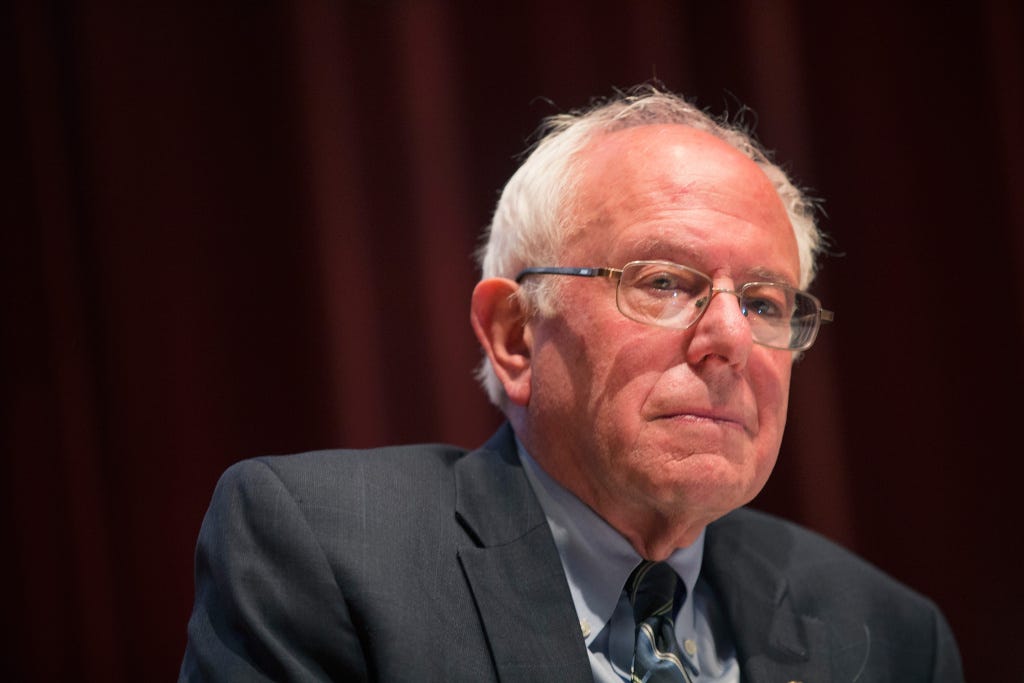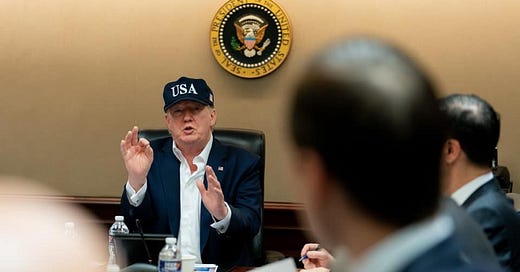Know Nothings: The Coronavirus Irony
Ironically, the know-nothings suddenly need the know-somethings to survive.

by Rich Herschlag
It is widely reported that Donald Trump enjoys a deep connection with his base, particularly the portion of his base that shows up at rallies. Did you ever wonder about the true nature of that connection? It’s not rooted in socioeconomics. While Trump boasts ill-gotten gains, MAGA folk boast nil-gotten gains. It’s not geographic. While Trump hails from New York, most of the base has gotten only so far as catching televised pieces of the Macy’s Thanksgiving Day Parade back in their murky youth.
Hatred is a one-size-fits-all answer but only partly accurate. While the red pill, redneck, red state crowd certainly hates a wide variety of races, religions, sexual orientations and Spotify playlists other than their own, it is not entirely clear to anyone that Donald J. Trump personally gives a damn about much of that. Much of what and whom he professes to despise comes across on any given day largely as lip service or propaganda even to his true followers.
What Donald Trump and his unkempt millions share on a more profound level is hatred of knowledge. Not hatred of the many substitutes for knowledge that take the form of convenient untruths, dirt on a political enemy, or a statistic unmoored from context, but rather hatred of the deep and thorough knowledge of subject matter that comes only from countless hours over many years dedicating oneself to a discipline. Other than unconditional love, such knowledge is the hardest thing in life to acquire, the most genuine, and virtually impossible to steal. It is precisely this hatred of both knowledge and the nerds who have paid their dues in search of it that has defined this era and has now come home to roost like a viral chicken.
Like most people, I know a little bit about this and a little bit about that. I can tell you a fair amount about dominant bands and ballplayers of the 1970s. I can parallel park like the vehicle is being lowered by a helicopter. I can explain the basic concept of a black hole. But these talents are all the result of a hobbyist’s enthusiasm and hold little or no intrinsic value unless you’re playing Trivial Pursuit, running late to a physical therapy appointment, or getting stoned.
Fortunately I have one area of expertise—civil/structural engineering—that makes me indispensable in certain situations and a go-to guy for various public works debates. And like countless other people with such an area of expertise, I paid a steep price for it. A four-year degree plus six years to acquire a state license were just the entrance fee. When you live and breathe something for decades, supporting your family and helping steer numerous fates and fortunes into the wee hours of the night, it becomes part of your DNA. It’s a blessing. It’s a curse. It’s you. And Trump and his minions hate you for it.
The relatively innocuous part of that hatred attends rallies, where Trump stumbles and bumbles and blathers about topics that largely escape him and is cheered on. He gives someone a stupid nickname, makes some obscure reference to old warhorse dishwashers, utters some gibberish indecipherable even to autocorrect and the crowd goes wild. The overriding message is clear, the feeling vicarious. You know nothing. We know nothing. You are president. We could be president, too.
The more lethal part of knowledge hatred, however, has gradually gutted our form of government and is working hard to finish it off as we clear the shelves of bread and hand sanitizer. This hatred is most readily apparent in the persecution of longtime civil servants like Marie Yovanovitch, Fiona Hill, and Alexander Vindman. The hatred is multifaceted. There is envy at the notion of someone possessing so much focused learning and being so legitimately indispensable. There is further envy of the self-discipline required to attain such knowledge—this from folks whose idea of a Sunday afternoon is eating tater tots and masturbating.
Most tangibly, there is the legal and moral danger posed to know-nothings by know-somethings in times of peril. During peril is when the know-somethings leak, whistleblow, testify, and generally go on record as saying, Yes, I have dedicated my life to this particular area of inquiry and have absolute proof that Vladimir Putin has instructed his operatives to interfere in the 2020 US presidential election. It is specifically at this point the know-nothings must show who’s boss by rooting out the know-somethings, intimidating them, threatening them, humiliating them, transferring them, firing them, and—if it comes to it—eliminating them. Yes, you might be a clearly superior human being in mental, physical, moral, human, spiritual and legal terms. But we won.
I was a know-something in 1994 when as borough engineer I noticed a strange aberration in the Manhattan daily sewage flow data that conveniently opened the door to final zoning approval for Trump’s controversial juggernaut multibillion dollar West Side development. Rather than become a so-called whistleblower, I went gently up the chain of command. Because the very same Donald J. Trump had during this earlier sordid heyday gotten his hooks into the people I reported to, I was promptly rooted out, intimidated, threatened, humiliated, and transferred in the hopes I would quit, which I did. This is an ancient game the know-nothings play with the know-somethings. The know-nothings are swift, vehement, ruthless and expert at this, because this is all they have. That is the one thing know-nothings know.
This dynamic is readily apparent on any given day at any given Trump rally in any given red county. When the attendees look up at Trump, they don’t simply see a seething white man lending animus to their aggressions and prejudices. They see an undisciplined mess of a man without the willingness or ability to engage in perhaps the most taxing but most rewarding of all human activities—scholarly inquiry. Deep thought equals deep state.
The original Know Nothing party was founded in the 1850s in response to the collapse of the Missouri Compromise and the resulting disorder regarding slavery. The party’s philosophical underpinnings consisted of prejudice against Catholics, hatred of immigrants, and general xenophobia. The more formally known American Republican Party got their nickname when they told members if asked about their political affiliation to respond that they knew nothing. Today’s Know Nothings are still American, still Republican, and know less than ever. Ironically, they suddenly need the know-somethings to survive.
Get 50% off a membership today to The Banter Newsletter today. You’ll get access to premium articles, our extensive archive, and be able to participate in chats with Banter writers and readers. No ads, no spam. Ever.
Read the latest for Banter Members:
We Must Eradicate "Patient Zero" In Our Political Pandemic. And That is Trump and Trumpism.
This is why so many Democrats have risked illness by waiting in interminable lines to vote for Joe Biden, says Bob Cesca

Sorry, Bros. No Repeat Of 2016 For You.
Bernie Bros wanted a do-over of 2016 and they were going to ridiculous lengths to get it, says Justin Rosario

Bernie's Supporters Are Ruining His Presidential Campaign
It is a shame so many of Sanders’ supporters have no interest in what their leader actually believes in, says Ben Cohen






Another point--this is the end result of a 40 year battle by the Religious Right to cripple the education system in this country. "Christian" home schooling has created a generation of drones that mindlessly flood their Corporate masters and vote Republican.
Listening recently to my Republican/Libertarian friends at the gym, I see the mentality presciently described in this article. They are not simply 'know nothing' but in fact 'have all the answers' and therefore don't have any interest or reason to believe that anything other than what they want to believe is true. The reason they adore Trump is because he simply vilifies the "enemy:" everybody who disagrees with him. Having a mouthpiece platform like Twitter has enabled him to do this; and because our media reports everything without a filter, the loudest voice wins. That loud voice is Trump and his MAGA/Fox News base. By distorting the truth to whatever he sees fit, Trump and his MAGA crowd are destroying our Republic because the Constitution was founded on principles of truth and reason.